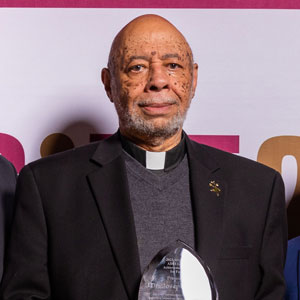April 22, 2025
SIU’s Father Brown: Pope Francis’ legacy is advocating for the marginalized, forgotten
CARBONDALE, Ill. — Pope Francis will be remembered as a cleric who emphasized dignity and who advocated for marginalized people throughout the world, says Father Joseph A. Brown, a professor and coordinator of Southern Illinois University Carbondale’s Africana Studies Program and director of the School of Africana & Multicultural Studies.
Pope Francis, who died on April 21 of a stroke at 88 years old, sought to make the Roman Catholic Church more inclusive, Brown said, and his election in 2013 “caught the world’s attention.” Pope Francis, who was from Buenos Aires, Argentina, was the first Latin American pontiff as well as the first to come from the Society of Jesus, or Jesuit order.
 Brown, also a Jesuit, said Pope Francis “spoke the truth in his heart directly to those he encountered, emphasizing the dignity and worth of all he carried in his concern. ‘Who am I to judge?’ was one of the most powerful statements any leader of religion has uttered in our lifetime,” Brown said.
Brown, also a Jesuit, said Pope Francis “spoke the truth in his heart directly to those he encountered, emphasizing the dignity and worth of all he carried in his concern. ‘Who am I to judge?’ was one of the most powerful statements any leader of religion has uttered in our lifetime,” Brown said.
“His advocacy for the marginalized, the forgotten, the victims of war and injustice will continue to be part of his legacy.”
Media availability
Father Joseph A. Brown, a professor and coordinator of SIU Carbondale’s Africana Studies Program and director of the School of Africana & Multicultural Studies, is available for interviews on Pope Francis’ legacy and impact on the Catholic Church and society. He can be reached at jbrownsj@siu.edu.
Brown noted that given the pope’s role as leader of a church with more than 1 billion members, Pope Francis made it a priority to visit as many sites as possible to tell his followers, and the world in general, “that all lives matter. His faith gave him the freedom to remind other world leaders of this belief.”
A ‘humble shepherd of the sheep’
Brown noted that Pope Francis focused on being “the humble shepherd of the sheep, including up to the week and day before his death.” The pope visited prisoners on Holy Thursday, greeted thousands of people in St. Peter’s Square following Easter Mass on Sunday “and reminded the world that all who are believers in the traditions established in Judaism, Christianity and Islam are called to treat the ‘alien and the sojourner’ with respect since all were sojourners and slaves in Egypt, before they were, as tradition says, delivered from bondage,” Brown said.
Pope prepared for this moment from the start
Media reports suggest that it will be two to three weeks before the College of Cardinals meets in Rome to select Pope Francis’ successor. Brown noted that Pope Francis chose and appointed “an overwhelming majority” of the clerics who comprise the 138 College of Cardinals during his 12-year papacy.
“From the first days of his role as pope, he was very clear in sharing his belief that he would not be pope for a very long time. So, from the beginning, he was preparing for this moment,” Brown said. “The men he appointed as cardinals in the Roman Catholic Church represent the global reach of the church in ways that were never realized before. They are from every continent and culture. They will honor his trust in them, I am sure.”
Brown, who was ordained into the priesthood in 1972, has been with SIU Carbondale since 1997, when he began as an associate professor and director of the then-Black American Studies Program before being promoted to professor in 2000. A native of East St. Louis, Brown earned a bachelor’s degree in philosophy from St. Louis University and a master’s degree in creative writing from Johns Hopkins University. He also holds a master’s degree in Afro-American studies and doctorate in American studies from Yale University. In 2023, Brown was one of two inaugural recipients of the SIU System’s Dr. Wesley G. Robinson-McNeese Anti-racism, Diversity, Equity and Inclusion Lifetime Achievement Award.
